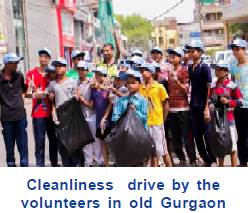|
Click2Clean E stimates by the Planning Commission, 2012, reveal that if the 62 million tonnes of waste that is generated annually, continues to be dumped without treatment, it will require 1240 hectares per year. No city or country can afford to provide so much land.In the recent past, a great deal of attention has been given to solid waste management in Indian cities both through the Swachh Bharat Mission (Urban) and the Smart Cities Mission. Both of these government initiatives aim towards ‘Integrated Solid Waste Management’ which provides modern and scientific solid waste management practices for a clean and sustainable environment. Click2Clean is a pilot initiative of Development Alternatives (DA) and CAF-India with the support of AON, to take a step towards mobilising individuals to keeping their surroundings clean through beautification of urban public spaces and creating awareness. The initiative focuses on anti-littering and beautification efforts by utilising the valuable input and participation of area residents, vendors, students and other civic groups. The duration of the programme was 3 months (April-June 2016) during which it advocated waste awareness and management in the urban public space and facilitated people to take action in their surrounding areas. For this intervention, a peri urban site at old
Gurgaon was identified due to its characteristics and location. The site
is adjacent to Sadar Bazaar and is highly populated because of its
proximity to the city bus stand. However, our focus was to mobilise the
students of the government senior secondary boys school and conduct a
collaborative intervention on the ground for greater impact. The objective of the programme was to educate local people, street vendors and students on maintaining public spaces and keeping them litter free. Also, to identify 50 volunteers who acted as agents of change and participated in workshops, cleanliness drives, mobilisation activities and wall painting. The introductory stage of the programme included identifying various stakeholders and sites for intervention, building associations with urban local bodies (Joint commissioner, sanitation department, vendor associations, school authorities etc), conducting interactive surveys to assess the current situation and the locals’ perception towards waste management and its importance. The intermediate stage consisted of multiple sessions and workshops with students (50) and street vendors (50) on the current waste scenario and waste management techniques. A number of dustbins were installed to spread the idea of waste segregation and its impact on the landfills. The concluding stage experienced a series of entertainment and public engagement activities for maximum visibility in the surrounding areas. An impactful street play by the Avantee academy artists was organised in Sadar Bazaar, followed by an hour long cleanliness drive by the school students, teachers, vendors and volunteers from DA. At the culmination of the programme, over a 3 day event DA got acquainted with the community through active participation and reach out to a large audience outside the school premise through music, dance and art via direct spontaneous engagement. The festival consisted of events such as a drum circle performance, beatboxing, B-boying dance etc which brought the spotlight towards environmental concerns, public concerns that arise due to open garbage spots and related health hazards. Targeting people through these activities was a great way to reach out to potential society change makers, celebrate togetherness and also to promote the idea of becoming responsible citizens in our own cities. The initiative was simultaneously promoted via social media (through facebook). The highlight of the programme was the collaborative art done on the 400m long school boundary wall, which was previously used negatively for urination and dirtied with posters and bills stuck on it. The mural was implemented with the support of St+Art India foundation that works on art projects in public spaces. The aim was to spread the message of the 3 R’s of environment ‘Recycle, Reuse, Reduce’, along with creating awareness regarding the waste we produce and the ways to manage it and embed it within the cities we live in - making art truly democratic and for everyone. The impact of the programme was resounding. Over 100 students who participated, felt a sense of pride and ownership towards the space and have further contributed in advocating towards the sustainable waste management practices within the school and outside. Over 2000 people were reached out to, through the various activities and mediums. As a result, the surrounding area has experienced a noticeable difference in the cleanliness levels and the wall art intervention has left an impact strong enough for people to not just keep it clean but also practice the message of waste management that is shared through it. Post the success of this pilot project, the programme in the next phase looks forward to replicate this behaviour change model alongside certain on-ground interventions in different sites across Gurgaon with the support of the Haryana government and the respective funders. ■ Jubin Jacob
|
